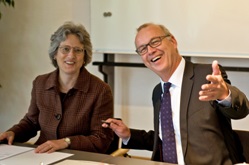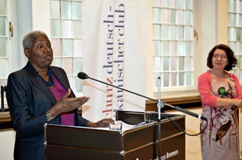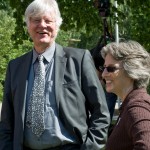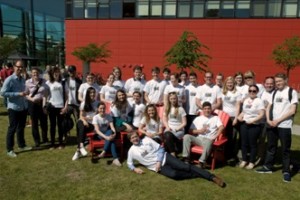Upon the celebrations of the 30th anniversary of the William G. and Elke Durden Dickinson Program in Bremen, est. 1985, we put together a short history of the program. See here:
Monthly Archives: June 2015
“DICKINSON IN GERMANY” TURNS 30
“And they celebrated for three days and three nights.” This is not only typical for fairy-tale endings when the prince and his bride are happily married, but it also happens in the city of the famous “Bremen Town Musicians” when an American college and a German university commemorate 30 years of a wonderful and strong partnership.
In order to duly celebrate the anniversary of their exchange program, Dickinson College sent a delegation to the University of Bremen in early June which included President Nancy Roseman, Vice President Joyce Bylander, Director of Education Abroad Samantha Brandauer as well as Sarah McGaughey and Jerry Philogene, professors of German and American Studies respectively. They were warmly welcomed by their partners at Uni Bremen and by our Bremen Program staff (Academic Director Janine Ludwig and Program Coordinator Verena Mertz) who had organized several festive events in that first week of June.
Signing of the Renewed Cooperation Agreement, June 3rd
On June 3rd, 2015, Nancy A. Roseman, President of Dickinson College, and Prof. Dr.-Ing. Bernd Scholz-Reiter, Rector of the University of Bremen, are happy to sign a renewed cooperation contract that extends the fruitful collaboration for another 5 years into the future.
The Third Dickinson College Public Lecture, June 3rd
In the eve ning of that day, the third annual Dickinson College Public Lecture was delivered in the prestigious venue “Stadtwaage” to an audience of about 100 attendees from the University and the city of Bremen.
ning of that day, the third annual Dickinson College Public Lecture was delivered in the prestigious venue “Stadtwaage” to an audience of about 100 attendees from the University and the city of Bremen.
After Rector Scholz-Reiter and President Roseman welcomed the audience, Prof. Dr. Karakaşoğlu, Vice Rector for Intercultural and International Affairs at the University of Bremen, introduced her colleague, VP and Dean of Student Life Joyce Bylander who gave a speech on “Delivering on the Promise of Diversity in Higher Education.” The topic and the lecture strongly resonated with the Bremen audience who participated in a lively discussion after the talk and during the following reception.
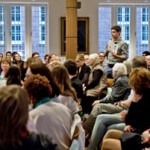
Dickinson Graduate Geo Nikolov ‘14, now a Masters student in Málaga, Spain, with an audience question
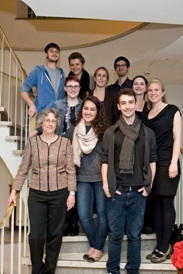
President Roseman with current Dickinson in Bremen students Ezra, Katie, Cassie, George, Adrienne, Madison, Santiago (fr. top left to down right) as well as Director Ludwig and Coordinator Mertz (far right, 3rd + 2nd row). © Harald Rehling
The Dickinson Lecture is regularly organized by Dr. Janine Ludwig, Academic Director of the Durden Dickinson in Bremen Program, and Neil van Siclen, President of the Carl Schurz German-American Club Bremen (CSDAC).

Fr. left to right: Dr. Janine Ludwig, VP Joyce Bylander, President Nancy Roseman © H. Rehling
Alumni Meeting With Unveiling of “Dickinson Chairs,” June 4th, 2015
Aside from current and former professors and staff who are or were involved in the program, more than 30 former students came from all over Germany and even from other European countries to the alumni meeting on Thursday afternoon. The altogether 60 attendees watched a delightful and funny picture presentation given by Matthias Ziegfeld, the very first Bremen student who studied at Dickinson College in 1984-85.
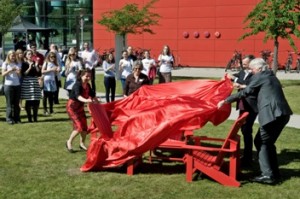
Vice Rector Karakaşoğlu, President Roseman, Mr. Sodemann from Community e.V., and former Rector Müller (from left to right), unveiling the first “Dickinson Chairs.” © Harald Rehling, Uni Bremen
Later, in the most beautiful sunny weather and over the traditional German “coffee and cake,” they rejoiced in memories of their time at Dickinson and the Uni Bremen. It was amazing to hear from many how the abroad experience has stimulated and influenced their lives. Eventually, the champagne bottles demanded to be opened for the ceremonious unveiling of the first three “Dickinson Chairs.” This Uni Bremen fundraising initiative honors the 30 years of cooperation by setting up Dickinson-like Adirondack Chairs on their campus which are donated by various sponsors. 10 such sponsors – including Pres. Roseman for Dickinson College and former Pres. Durden as well as former Uni Bremen Rector Wilfried Müller – had already pledged a donation before the campaign was even officially launched.
Festive Dinner, June 4th
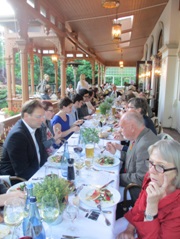
Front, right: Erika Harjes-Badawi, former head of the IO at Uni Bremen, behind her: professors Hartmut Koehler, Lothar Probst, left: Neil van Siclen, Dickinson students. © Verena Mertz
The day was concluded by a celebratory dinner in the restaurant “Meierei” to which Dickinson College invited so many of the colleagues and friends who have made vital contributions to the program over the last decades.
Other events included a tour through Bremen’s historical center and UNESCO world heritage site, a dinner in the medieval quarter “Schnoor,” a visit to the University of Bremen’s Drop Tower (the laboratory of ZARM and the only laboratory of this kind in Europe). In addition, in many work meetings members of both institutions forged plans for future projects to further intensify this great cooperation.

